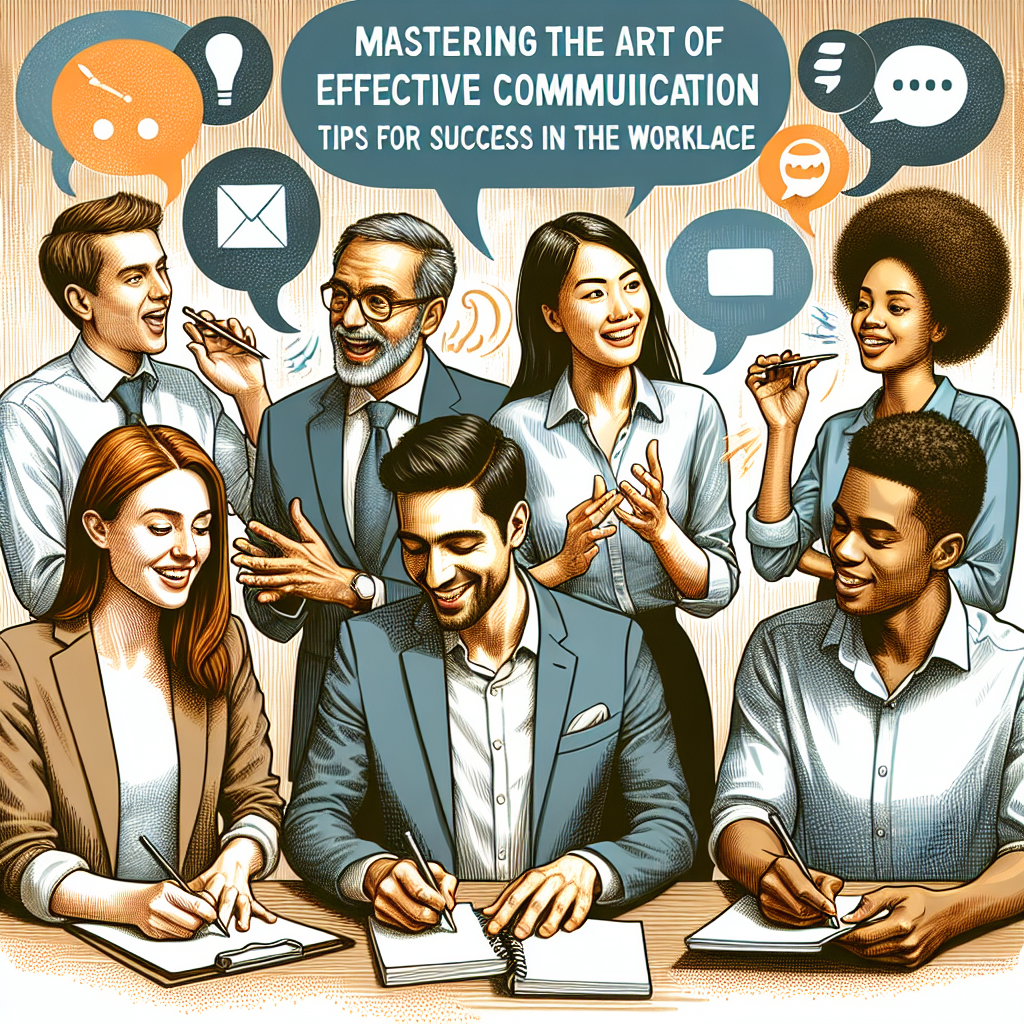In the fast-paced world of today’s workplace, effective communication is key to success. Whether you are leading a team, collaborating with colleagues, or pitching ideas to clients, your ability to communicate clearly and confidently can make all the difference in your career progression. Mastering the art of effective communication takes time and practice, but with the right mindset and strategies, you can become a more influential and successful communicator in the workplace.
Here are some tips for mastering the art of effective communication in the workplace:
1. Know your audience: Before you communicate with someone, take the time to understand who they are and what their communication style is. Tailoring your message to fit the needs and preferences of your audience will make your communication more effective and impactful.
2. Be clear and concise: Avoid using jargon or technical language that may confuse your audience. Instead, strive to communicate your message in simple, easy-to-understand terms. Be direct and to the point, so that your message is clear and concise.
3. Listen actively: Effective communication is a two-way street. Make sure to listen carefully to what others are saying before responding. Pay attention to their nonverbal cues and ask clarifying questions if needed. By demonstrating that you are actively listening, you show respect for the other person and build rapport.
4. Use positive body language: Nonverbal communication plays a significant role in how your message is received. Use open body language, maintain eye contact, and smile to convey warmth and confidence. Avoid crossing your arms or fidgeting, as these gestures can signal defensiveness or lack of interest.
5. Practice empathy: Empathy is the ability to understand and share the feelings of others. By putting yourself in someone else’s shoes, you can better communicate with compassion and understanding. Show empathy by acknowledging the other person’s perspective and validating their feelings.
6. Be mindful of tone: Tone of voice can greatly impact how your message is received. Pay attention to your intonation and volume, as well as the pace of your speech. Adjust your tone to match the emotional context of the conversation, whether it’s delivering good news or addressing a challenging issue.
7. Give and receive feedback: Constructive feedback is essential for growth and improvement. Be open to receiving feedback from others and actively seek opportunities for self-improvement. Likewise, provide feedback to others in a respectful and constructive manner, focusing on specific behaviors and outcomes.
8. Use technology wisely: In today’s digital age, much of our communication is done through email, instant messaging, and video conferencing. Make sure to use technology wisely by choosing the appropriate communication channel for each situation. Be mindful of tone and professionalism in written communication, and use video conferencing to build rapport with remote colleagues.
9. Practice active listening: Active listening is a crucial skill for effective communication. Show that you are engaged in the conversation by nodding, paraphrasing, and asking clarifying questions. Avoid interrupting or thinking about your response while the other person is speaking.
10. Seek professional development opportunities: Effective communication is a skill that can be honed through practice and training. Seek out workshops, courses, and coaching programs that focus on communication skills development. By investing in your communication capabilities, you can enhance your effectiveness and success in the workplace.
Frequently Asked Questions:
Q: How can I improve my communication skills in the workplace?
A: Improving your communication skills in the workplace requires practice, feedback, and self-awareness. Seek out opportunities for professional development, such as workshops or coaching programs, and actively seek feedback from colleagues and mentors.
Q: What role does emotional intelligence play in effective communication?
A: Emotional intelligence is the ability to understand and manage emotions in oneself and others. By developing emotional intelligence, you can better navigate interpersonal relationships and communicate with empathy and understanding.
Q: How can I communicate effectively in a diverse workplace?
A: Effective communication in a diverse workplace requires cultural competence and sensitivity. Take the time to learn about different cultures, communication styles, and customs, and adapt your communication to fit the needs of a diverse audience.
Q: What are some common communication pitfalls to avoid in the workplace?
A: Common communication pitfalls to avoid in the workplace include: using vague or ambiguous language, not actively listening to others, failing to provide feedback, and relying too heavily on technology for communication.
In conclusion, mastering the art of effective communication is essential for success in the workplace. By following these tips and strategies, you can become a more confident and influential communicator, building strong relationships and achieving your professional goals. Remember, effective communication is a skill that can be developed over time with practice and dedication. Start applying these tips today and watch your communication skills soar to new heights.





Leave A Comment